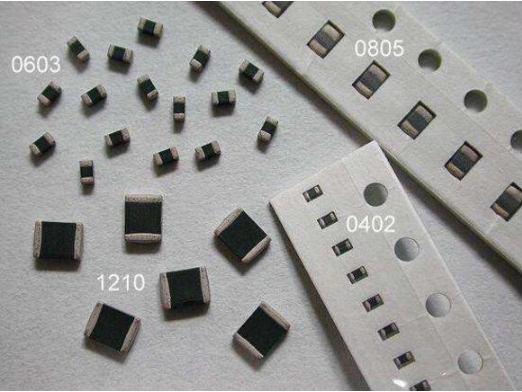Position:Home » Technical Articles
Different Types of Film Resistors
Writer:Microhm Page View:Date:2019-06-10
Resistors, like many electronic components, come in a variety of types, shapes, sizes, capacities, and each has significant differences in typical values for resistor wattage rating, tolerances, temperature coefficient, noise, voltage coefficient, frequency response, size, and reliability. Film resistors are most used ones in circuits and consist of
carbon composition resistors, carbon film resistors, thick film resistors, thin film resistors and metal film resistors. Take the last two for instance.
Borrowing from semiconductor processes, thin film resistors are made through a vacuum deposition process called sputtering where a thin layer of conductive material is deposited on an insulating substrate. This thin layer is then photoetched to create a resistive pattern.

By precisely controlling the amount of material deposited and the resistive pattern, tolerances as tight as 0.01% can be achieved with thin film resistors. Thin film resistors are limited to about 2.5 watts and lower voltages than other resistor types but are very stable resistors. There is a price for the precision of thin film resistors which generally are twice the price of thick film resistors.
When mentioning film resistor, we take metal film resistors into account. They are very similar in construction to carbon film resistors, with the main difference being the use of a metal alloy as the resistive material rather than carbon.

The metal alloy used, typically a nickel-chromium alloy is able to provide tighter resistance tolerances than carbon film resistors with tolerances as tight as 0.01%. Metal film resistors are available up to about 35 watts, but resistance options begin to diminish above 1–2 watts. Metal film resistors are low noise, and stable with little resistance change due to temperature and applied voltage.
carbon composition resistors, carbon film resistors, thick film resistors, thin film resistors and metal film resistors. Take the last two for instance.
Borrowing from semiconductor processes, thin film resistors are made through a vacuum deposition process called sputtering where a thin layer of conductive material is deposited on an insulating substrate. This thin layer is then photoetched to create a resistive pattern.

By precisely controlling the amount of material deposited and the resistive pattern, tolerances as tight as 0.01% can be achieved with thin film resistors. Thin film resistors are limited to about 2.5 watts and lower voltages than other resistor types but are very stable resistors. There is a price for the precision of thin film resistors which generally are twice the price of thick film resistors.
When mentioning film resistor, we take metal film resistors into account. They are very similar in construction to carbon film resistors, with the main difference being the use of a metal alloy as the resistive material rather than carbon.

The metal alloy used, typically a nickel-chromium alloy is able to provide tighter resistance tolerances than carbon film resistors with tolerances as tight as 0.01%. Metal film resistors are available up to about 35 watts, but resistance options begin to diminish above 1–2 watts. Metal film resistors are low noise, and stable with little resistance change due to temperature and applied voltage.
Keywords:Film resisto
Latest News
- Resistor's role in measuring and correcting LED,,,
- Single through-hole resistors' characteristics ,,,
- Why shunt resistors for current sense applicati,,,
- Metal-film resistors with small size, high resi,,,
- 36W High-Current Shunt Resistors MMS8420,,,
- 1W Surface Mount Resistor MPR1206,,,
- An Overview of Microhm Electronics' Resistor Pr,,,
- More anti-sulfur resistors used in harsh envir,,,
- Resistance changes with temperature,,,
- 140W TO247 High Power Heatsinkable Resistor,,,
- MMS5930 is ideal for current sensing in industr,,,
- Shunt resistors selection for engineers' design,,,
- Considerations for choosing precision resistors,,,
- Ceramic Encased Cement Resistors NWH Series for,,,
- Resistors for Passive Balancing in Battery-Pow,,,
Hot Articles
- Microhm will take part in 10th Automotive World,,,
- Thanks for Visiting Microhm's Booth E5-5706 in ,,,
- Resistors in Short Supply: Blame Cars,,,
- New lunch: High Power Precision Shunt Resistor,,,,
- How to Test a Resistor,,,
- Innovative Technology, Future Electric: Electri,,,
- What is Precision Resistors?,,,
- SMD Resistors Sizes and Packages,,,
- The Construction and Features of Metal Film Res,,,
- What is a TO-220 Resisor?,,,
- Hot Selling Products: Precision Shunt Resistors,,,
- How to Calculate the Equivalent Resistance Valu,,,
- What is a Fixed Resistor?,,,
- Resistors in LED Circuits,,,
- Resistors Types and Materials Overview,,,
Resistance applications
- Industrial Roberts Applied to Solar Photovoltai,,,
- The Measurement Accuracy of Automotive Shunt is,,,
- Precision Resistors' Construction and TCR,,,
- BMS for New Energy Vehicle,,,
- Surface Mount Resistor's Size and Package ,,,
- The Four Important Functions of Alloy Resistors,,,
- Shunt Resistor MMS8420 for High Current Stable ,,,
- Difference Between High Precision Resistors and,,,
- Miniature future for passive electronic compone,,,
- Select the Right Resistor for Harmonic Filterin,,,
- The Main Application for High Precision and Low,,,
- Carbon Film Resistors' Features and Application,,,
- Why Zero-Ohm Resistors?,,,
- Urbanization Development Bringing the Transform,,,
- Heater Blower Motor Resistor in Air Conditioner,,,
